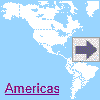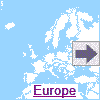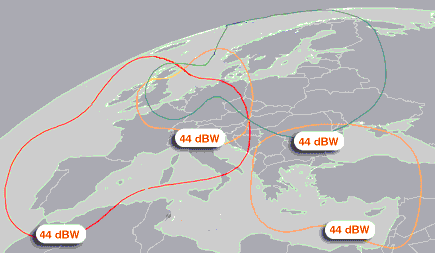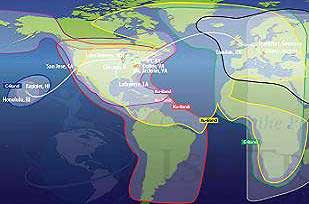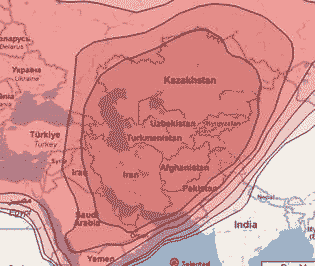Satellite Internet plan could threaten GPS
Posted by
world Jr at Thursday, March 10, 2011
Small, inexpensive GPS jammers carried by truckers have caused the occasional shutdown of the Laas test installation at Newark Airport. The devices, powered by simply plugging into the cigarette lighter, are intended to foil interrogations of the truck's remotely installed GPS and its coupled cellphone by the trucking company's dispatcher to check on the vehicleπs location and progress.
No one has a firm estimate of the number of truck drivers who carry GPS jammers in their back pockets as they roll down the interstates: estimates vary from "a few thousand" to "tens of thousands." However, their jamming periods are usually fairly short and infrequent, and regular unscheduled stops in the same area could soon attract a dispatcher's attention. On the other hand, since there are not too many likely stopping places of interest on the New Jersey Turnpike abeam of EWR, it seems probable that some drivers are forgetting to unplug their jammers after their last unscheduled stops.
Nevertheless, the truckers' combined efforts could never even come close to matching the GPS-jamming potential of the 40,000 much higher powered ground transmitters that would form the mainstays of a nationwide satellite voice and Internet data service proposed by LightSquared, a company formed last year.
Coast-to-coast Network
Using LightSquared data in preliminary laboratory tests, Garmin experts demonstrated that such stations would start to interfere with a standard production TSO'd and LPV-capable GPS airborne receiver at a range of 13.8 miles and would totally jam it at 5.6 miles. In Garminπs words, should the FCC approve LightSquared's proposal, the transmitter network would cause "widespread severe GPS jamming," and would "deny GPS service over vast areas of the United States." Unstated by Garmin would be the parallel impact on ADS-B, as well as the loss of vital GPS timing within the nationπs critical government and commercial infrastructure.
How can this be allowed? Essentially, it is because LightSquared will operate in the L-Band radio frequency group from 1525 to 1559 MHz assigned to mobile satellite services (MSS), while GPS operates in the adjacent radio navigation satellite service (RNSS) group from 1560 to 1610 MHz. And until now, operators such as Verizon, Sprint and others have followed the customary MSS practice of transmitting very-low-powered space-to-earth signals, supplemented in most cases by a small number of equally low-powered ground stations at locations with high radio noise backgrounds, and with neither having any effect on GPS. When LightSquared entered the scene last year by acquiring Terra–which already had a compliant MSS operation and the first of two new satellites under construction–it was expected to follow the same practice.
This turned out not to be. While the several current MSS operations have been only marginally profitable, with bankruptcies not uncommon in the past, LightSquared brought with it a different game plan. Possibly triggered by President Obama's 2010 initiative of unleashing the wireless broadband revolution, and with financial backing in the billions and a management team recruited from the top levels of the international satellite community, LightSquared stated that it would not offer its own services but would act solely as a wholesale provider of the satellite service to customers for their own applications. It subsequently requested an FCC waiver from an important provision of the licence it had acquired from Terra. That provision was the standing rule that an MSS operator with supplementary ground stations could only provide combined satellite/terrestrial user equipment to its customers. LightSquared defended its request by stating that while it would not itself offer terrestrial-only user equipment to its wholesale customers, "it contemplates that its customers may well offer terrestrial-only subscriptions to its consumers."
The FCC permitted the waiver, which would allow LightSquared to move away from the typically small number of low-powered MSS ground stations and establish a coast-to-coast network of 40,000 powerful stations to bring high-speed voice and Internet connectivity to 92 percent of the U.S. population by 2015, and to 100 percent a few years later. And although these stations are operating just outside the satellite navigation band, observers believe that their transmissions are certain to adversely affect GPS.
As a result, there has been widespread opposition to LightSquared's plan from all corners of the commercial satellite community and various user groups, including NBAA, as well as the federal departments of defense, transportation, commerce and homeland security. But the plan is already under way. On November 14 last year, LightSquared launched the first of its new geostationary satellites, the Boeing-built Sky Terra 1 with, at 72 feet in diameter, the biggest commercial antenna reflector in space. Its companion Sky Terra 2 satellite is forecast to be launched next year. Separately, cellphone builder Nokia is designing and will install and operate the ground station network under an eight-year, $7 billion contract from LightSquared.
Fortunately, the FCC hedged its waiver with the requirement that LightSquared cannot offer commercial services before an independent expert panel has agreed, over the next three months, that no risk of interference to GPS or other aviation or marine satellite services exists. LightSquared agreed to that condition, noting that full GPS operation would be essential to its own program, and also offering $20 million toward underwriting the investigations. But at the same time, the company implied that corrective action was not solely its responsibility, and suggested that the GPS community should also propose remedial measures. Somewhat surprisingly, the FCC appeared sympathetic to that viewpoint. The issue is therefore by no means settled, since it is difficult to see a solution that might require modifications to, or replacement of, GPS receivers already in civil use, assuming that the large majority of military systems already have adequate interference rejection capabilities.
Yet beyond such questions is an overriding basic issue that, rather surprisingly, does not appear to have been publicly raised or discussed by any of the parties involved. This is whether, in the interests of U.S. national security and the U.S.'s promise to the international community to provide unhindered access to GPS, DOD could exercise a veto on LightSquared's program, should the company state that it is either unwilling or unable to accommodate the civil user community's demands. Presumably that would be an option, and its availability as a rather powerful bargaining chip might be prudently introduced at an early stage in the three-month analysis.
source: www.ainonline.com




